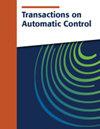Tighter Analysis for Decentralized Stochastic Gradient Method: Impact of Data Homogeneity
IF 7
1区 计算机科学
Q1 AUTOMATION & CONTROL SYSTEMS
引用次数: 0
Abstract
This article studies the effect of data homogeneity on multiagent stochastic optimization. We consider the decentralized stochastic gradient (DSGD) algorithm and perform a refined convergence analysis. Our analysis is explicit on the similarity between Hessian matrices of local objective functions, which captures the degree of data homogeneity. We illustrate the impact of our analysis through studying the transient time, defined as the minimum number of iterations required for a distributed algorithm to achieve comparable performance as its centralized counterpart. When the local objective functions have similar Hessian, the transient time of DSGD can be as small as分散随机梯度法的严密分析:数据同质性的影响
研究了数据同质性对多智能体随机优化的影响。我们考虑分散式随机梯度(DSGD)算法,并进行了精细的收敛分析。我们的分析明确了局部目标函数的Hessian矩阵之间的相似性,它捕获了数据同质性的程度。我们通过研究暂态时间来说明我们的分析的影响,暂态时间定义为分布式算法实现与集中式算法相当的性能所需的最小迭代次数。当局部目标函数具有相似的Hessian时,对于光滑(可能是非凸)目标函数,DSGD的瞬态时间可小至${\mathcal O}(n^{2/3}/\rho ^{8/3})$,对于强凸目标函数,DSGD的瞬态时间可小至${\mathcal O}(\sqrt{n}/\rho)$,其中$n$为agent数,$\rho$为图的谱间隙。这些发现为DSGD的实证成功提供了理论依据。我们的分析依赖于一种新颖的观测,该观测具有高阶泰勒近似的梯度图,这可能是独立的兴趣。数值模拟验证了我们的发现。
本文章由计算机程序翻译,如有差异,请以英文原文为准。
求助全文
约1分钟内获得全文
求助全文
来源期刊

IEEE Transactions on Automatic Control
工程技术-工程:电子与电气
CiteScore
11.30
自引率
5.90%
发文量
824
审稿时长
9 months
期刊介绍:
In the IEEE Transactions on Automatic Control, the IEEE Control Systems Society publishes high-quality papers on the theory, design, and applications of control engineering. Two types of contributions are regularly considered:
1) Papers: Presentation of significant research, development, or application of control concepts.
2) Technical Notes and Correspondence: Brief technical notes, comments on published areas or established control topics, corrections to papers and notes published in the Transactions.
In addition, special papers (tutorials, surveys, and perspectives on the theory and applications of control systems topics) are solicited.
 求助内容:
求助内容: 应助结果提醒方式:
应助结果提醒方式:


